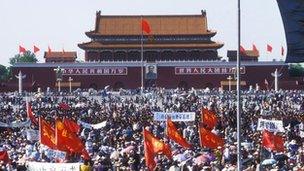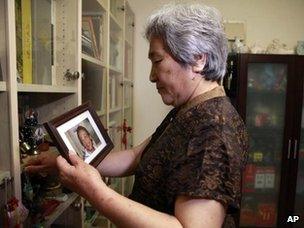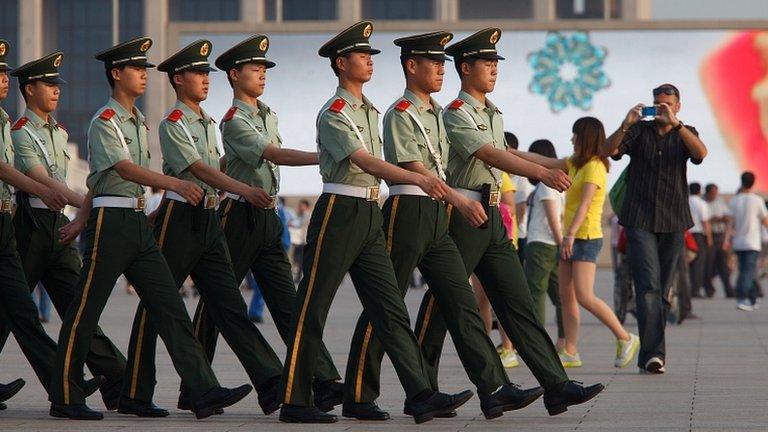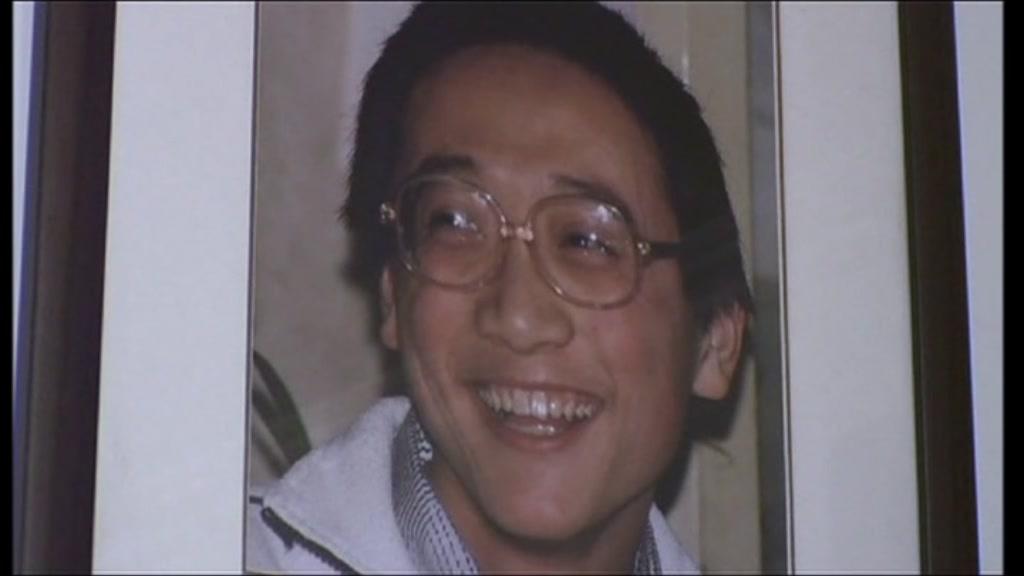Remembering the Tiananmen massacre
- Published
- comments
Twenty-three years after the massacre at Tiananmen Square, Chinese authorities continue to suppress the memory of it
China has detained political activists and placed others under increased surveillance in cities around the country to prevent them from marking the anniversary of the massacre in Tiananmen Square on Monday.
Hundreds died when the Communist Party used the army to crush pro-democracy protests in 1989. On Sunday, the US called on China to stop harassing those who took part in the Tiananmen protests and their families.
But the Communist Party still tries to suppress any mention of the killings.
"Long live democracy," shouts Mei Chongbiao, his fist in the air. "Down with dictatorship."
The 73-year-old and a few of his friends staged their tiny protest a week ago, then posted footage of it on the internet.
Speaking by telephone, Mr Mei told us he had witnessed the Tiananmen massacre when he was a fruit-seller in Beijing 23 years ago. He had kept silent for years to protect his own family, but had now decided to speak out.
He staged his protest in a park in the province of Guizhou, in the far south-west of China.
Nestled in a valley in some beautiful green hills, the park is full of families strolling leisurely, old men seated at tables playing cards, and musicians playing mournful tunes by a lake dotted with lily pads and lotus flowers.
From a pavilion on a hilltop in the park, you can look out over the fast-rising office towers and apartment blocks of Guiyang, a city of more than three million.
Public denunciation
China's Communist Party goes to great lengths to prevent any mention of the Tiananmen massacre - events to commemorate it are suppressed. Mei Chongbiao's was a rare public denunciation of Communist-rule in China.
So we took the three-hour flight from Beijing to Guiyang to meet Mr Mei.
His home is modest flat up a grubby alley lined with vegetable stalls. But when we got there, his 32-year-old son Mei Zuheng, who is disabled having lost a leg in a road accident when he was a child, told us we were too late.

Students on Tiananmen Square 23 years ago were dispersed with tanks and bullets
The police had raided the flat just after we spoke to his father on the phone. They had ransacked the apartment, strewing papers everywhere, then taken his parents away, along with their computer and any literature they found about the Tiananmen massacre.
Mei Zuheng said the police had told him his father had not committed any crime, but was against the Communist Party and had to be investigated.
"My father saw what happened in 1989, he saw the killings of innocent people. He was scared. He had two young sons and his wife to look after," he explained.
"But now my brother and I have grown up. He felt as a Chinese, he should tell people what he saw. What he can do is limited, but if no-one talks about it, people will forget about the event. The official media never mentions it.
"Only political reform cannot solve China's problems. Corruption is pervasive. Officials big and small are corrupt," Mei Zuheng added.
"China is like an apple that's rotten inside. On the surface, you see little. People think the apple is still edible. But it is not," he told us. "Our whole system needs changing or we'll never have human rights."
Xiong Canfeng's husband was detained along with Mei Chongbiao last week.
She showed us the small camera on which she had filmed the protest in the park.
The police had demanded she hand the camera over. But she had hidden it, hoping people outside China would see the images.
They had threatened that if she did not co-operate, her son would never get a job once he left university.
"They mean what they said. They can certainly do it," she told us.
"I support my son's education by selling vegetables. Once they smashed my stall and later promised to pay 20,000 yuan ($3,140, £2,043) as compensation. But now they are saying they won't pay me."
"We want change," she said. "We think with freedom and democracy, people can lead better lives. Without them we'll just be controlled and cheated by the powerful."
Leadership change

Zhang Xianling is not optimistic that the change her son fought for would happen
In 1989, hundreds were gunned down as they called for greater political freedom and an end to corruption in China, issues that are still pressing today.
The last Communist leaders who were in power then are due to retire later this year when China undergoes its once-in-a-decade leadership shuffle. So will the incoming leaders be prepared to do things differently?
Zhang Xianling's son Wang Nan was 19 when he was killed at Tiananmen. She has little faith that China's new generation of leaders will bring any new approach.
"Changing our leaders is unlikely to make any difference," she said ahead of this anniversary. "Our hope things will change is just a beautiful, distant desire."
And in Guiyang, there is no sign that the Communist Party is prepared to rethink things.
Just after they spoke to us, Mei Chongbiao's son and Xiong Canfeng, who had hidden the film, were both detained by police.
Rather than address Tiananmen and the issues that caused it, China's leaders continue to suppress even the memory of the massacre.
- Published3 June 2012

- Published4 June 2012

- Published31 August 2012